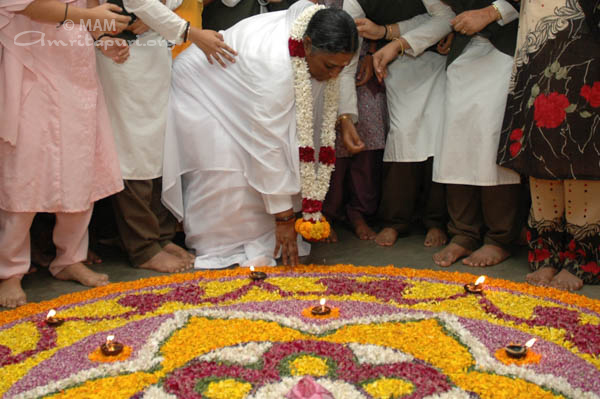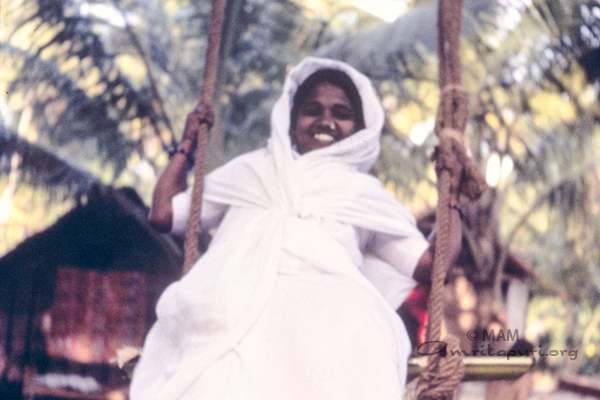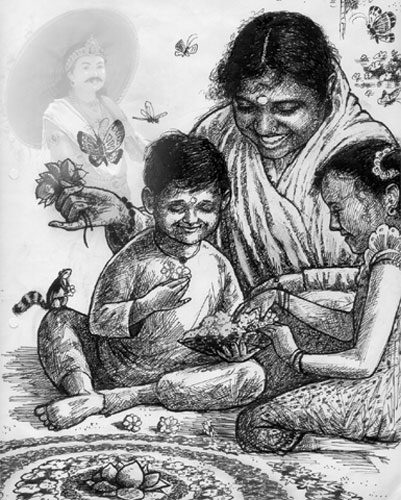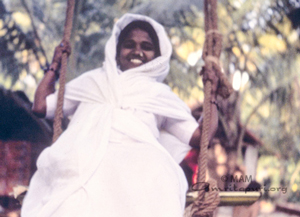5 September 2005 — Amritapuri
When a leading Malayalam newspaper reporter from Kerala recently asked Amma to tell him about her Onam memories of long ago, an unforgettable satsang poured forth. In talking about Onam and the village life of her youth, Amma found the perfect medium to share her vision of life, a vision wherein every day is a celebration.
[Onam is a special festival of Kerala. Read about Onam.]

Living the Principle
“In my vision, every day is Onam.
“In this village, the houses are very close together, so the children would go to the neighbouring houses in the evening to play, and then they might eat dinner and sleep there itself. Whether it was a boy or a girl, their mother wouldn’t worry because she knew her child was safe.
“When someone visited your house, you would feed them. When you visited their house, they would feed you. There was no such thing as waiting for the guest to leave before eating. There was no need for matchboxes—we would take fire for lighting the kitchen stove from whoever nearby had it already burning. Similarly, when they lit the deepam for the evening prayers, they would light it using the fire from a neighbour’s house. That’s they way it was.
“Even if a stranger came to the house, he would be provided with accommodation. If it were a small house, they would somehow find space for him in a storeroom or by the cowshed.
“Dharma and love—through these everything was provided in my youth.
“On Onam, people would buy and wear new clothes. Normally, they would have fish every day for lunch, but on Onam they would not fish. They would have payasam and more vegetable curries. This is back then, not now.
“Drumstick [the pod from the Moringa tree] was a specialty. Every house used to have a drumstick tree, so they would have that every day… but only on Onam would they buy extra vegetables and make special curries.
“About 50 or 60 houses from each village would assemble in the courtyard, and they would put up a big swing and sing songs of Mahabali, like:
മാവേലി നാടുവാണീടും കാലം മാനുഷരെല്ലാരും ഒന്നുപോലെ
“Maveli nadu vaneedam kaalamManushayellavarum onnu pole”
[During the time when Mahabali was ruling the country all of humankind lived as one.]
“Twenty girls and boys would sit together and sing. After the age of 12, girls were not sent to the village shops to buy things, but during Onam, the boys and girls would mingle together and swing and sing and prepare the pookkalams [flower-petal mandalas]. This was the Onam celebration.
“During the 10 days of Onam, the children would play without getting scolded or spanked by anyone in the family. During these 10 days, they would have so much freedom to play and shout and make noise. Usually the rule is that girls should not speak loudly or run: ‘If she walks, the earth should not shake.’ Boys could run. But on these 10 days, the girls could run, scream and shout. There was no difference between the boys and girls. They would dance together.
“Amma doesn’t think that other than these simple traditions, the people in Amma’s village understood any principle behind Onam. Even though they were singing the songs, they did not know the deep meaning behind them. During the time Mahabali was ruling the country, all of humankind lived as one… It doesn’t mean that everybody had the same height, talents, etc.—not like that. Everyone was living their own dharma.
“In my youth, whenever anyone came to our house, my mother would serve them food. And she would give the children the water left over from boiling the rice, adding to it some shredded pieces of coconut. She was worried about the guests. Were they fed enough? Were they happy or not? She wasn’t worried whether her children had had enough food or not. Her worry was whether or not the guests’ stomachs were full. We would prepare tea for anyone who came at anytime, also paan and beedis. Make them happy and feel good. Give them all comforts. These were the only thoughts. Even though they didn’t know the principle, they lived the principle.
“Even if the people in the village were very poor, they would buy new clothes for Onam. They would be so happy. When they received their new set of clothes, they would become happy in the same way that a starving man becomes happy when he receives food. It was the pinnacle of happiness for them.
“It wasn’t only a joyful time but also a time when they would shed their sense of ‘I’ and ‘mine.’ The differences between the poor and the rich disappeared. The poor would be welcomed into the rich people’s houses, and the rich would come down to the level of the poor. They were shedding their egos, thereby transforming themselves from small to big, from the seed to the tree—the tree that gives shade even to the one who is cutting it down, the tree that has patience, love and generosity.
“During Onam, my parents would give the mooppan [the coconut-tree climber] a new set of clothes and some money, as well as the carpenters, the dhobis [washer-men]…. And in turn they would all bring something to my father as well, like chunnamba [quicklime—pinches of which are mixed with betel-nut to make paan].
“Once on Onam, Amma’s brother gave clothes to the mooppan, and he threw them to him, instead of handing them. When the dhobis came, they would not touch the well. You would have to give them the water. They would not touch the well. This made Amma sad. Amma could not understand why it was like this. Amma would make them fetch their own water from the well. But father’s family did not like this. Now such a thing does not exist—it was in my youth.
“They understood that in order to receive God’s grace one should serve the poor. But here untouchability was there. Still, they served the poor because they wanted God’s grace. However, when they served the food, they would just put it down and go away. They did not know the principle.”

The pre-onam exams: then vs. today
“These days, children are eager to welcome Onam, but they also are tense because of their exams. The Onam and exams of today are different from the Onam and exams of yesterday. In my school days, there were no other languages taught in third standard. English and Hindi only came in fifth standard. A few words of Hindi were taught in the school. Amma learned English [the alphabet] only by looking at the calendar. At that time there were not so many books to create tension.
“On many of the holidays, the children would go to nearby mango trees to try to knock down the mangos. At least six months out of the year, the backwaters were fresh. All the children would run and jump into the water and yell and scream. Hearing this, all the grownups would come and beat them, but then after they left the children would jump into the water again. Only if our clothes were wet would our families come to know. In villages like this, up to the age of five, the children are not used to wearing clothes. There was no shame in it. They had an aranjnanam [string-like band] tied around their waist. The ones older than that would jump in with their clothes on and then, once in the water, they would take off their clothes, roll them up into a ball and then throw them onto the land. They would enjoy playing, swimming…. All the holidays were like this—knocking down mangos and swimming in the backwaters. Amma doesn’t think the children were very tense for the examinations in these villages. Only a few texts were there to be studied. There was no need to be tense.”
Collecting flowers for making pookkalams
“As Amma became a little older, I would go to collect toopu [long tender stems often used to feed goats]. There was only one house right next to our house. After that all the houses were surrounded by water and a little wooded area. There would be small areas like this around the kayal [backwater lagoon]. In places like these, there would be a small tree called kambatti [from which the toopu is gathered]. I would go there to fetch grass for the cows. Flowers used to grow around there [which Amma would collect for making pookkalams [the decorative flower-petal mandalas of Onam]. Then, when I was a little older, I would go east [across the backwaters to Vallikkavu]. For a while I studied tailoring there. I would swim to the other shore and, holding the flowers in my mouth, swim back.”

Onam is not for celebrating only one day a year
“For me, Onam is not something to be celebrated one day a year—making sure everyone has enough food and clothing. It is meant to be celebrated throughout life. Everyone must make every day an Onam celebration. Celebrating just once in a year… that doesn’t mean anything to me. To understand this principle, you have to understand spirituality.
“Today’s world believes the greatest relationship to be the relationship between a child and its mother. But in my world, it is not; the Guru-disciple relationship is. Because When you understand spirituality, you understand the principle. When you understand the principle, you become expansive. You lose your sense of ‘mine.’ My mother, my father, my child, my relatives…. In the Guru-disciple relationship, everything becomes ‘Yours’ [the Lord’s]. The ‘I’ disappears. Only the Atman exists. Love and serve others as your own Self. When the left hand is in pain, the right hand comes and consoles it. It is with this bhava [feeling and attitude] that we must live life. This is the principle behind Onam.
“Two plus two is always four—never five. No one can make it five. The sun rises in the East, and sets in the West. It doesn’t do the opposite on Onam. So there is nothing new on Onam. Amma doesn’t feel like Onam is a special day. May people have the mind to love and serve others and celebrate life every day—not just on Onam. This is Amma’s vision.
“You have to understand spirituality, our dharma. The road is for traffic, but you have to follow the rules. We are born to be happy. Along with that, you have a dharma. The teacher has her own dharma, the mother has her own dharma… When a teacher is at school, she must follow the dharma of a teacher, but when she is at home she has to follow the dharma of a mother. Everything has its own dharma. We have to act according to our dharma. Then the traffic of life will flow in harmony. Whether God exists or not is not the question. Regardless of the answer, how useful His message is in our life! This is what we have to investigate.”
We have lost our discrimination
“We need to develop the language of the heart. But now we are only developing our intellects. When there is a mixture of sand and sugar, the intellect cannot distinguish between the two, but the ant can come and take only the sugar. That’s the beauty of the heart.
“The intellect is like a pair of scissors, cutting everything in two. People say they have grown, but Amma doesn’t see any viveka [faculty of discriminative thinking] in them. They say they are growing, but Amma doesn’t see them expanding. They are intelligent, but don’t have viveka. They have the information but not the bodha [awareness]. The intellect has grown, but the heart is weakening. They have beautiful houses, but their families are falling apart. This is the world we are living in today. So there is no comparison between the Onam of today and the Onam of yesterday. Today, it is mechanical. Back then it was pulsating with life. There was heart and beat. Even if it was blind belief, there was a pulsation of love at its core. They were living the principle. Today, even though someone may know the principle, they are not living up to it. We lost our viveka. The intellect has grown, but our viveka has been lost.
“Because of this lack of viveka, the distance between family members is increasing. If there are three members in a family, they are living like three islands. We are not single islands; we are connected like the links of a chain. What we show our children, our children will emulate. If we do not look after our parents, our children will not look after us. That is the state we are heading towards. You get what you give. This is the best proof for the principle of karma.
“Today there also are celebrations, but the families go to some restaurant. In the olden days, all the children from far off places would come to the house. They would sing, dance, play and eat together. Not just the immediate family’s children, but all the children, mothers, fathers etc. would come to the taravadu [ancestral home]. Nowadays, they either eat at a restaurant or get take out. In the olden days, they would prepare weeks ahead, husking and pounding the rice for all the many family members who would come.”
The Relationship of Love
“I have seen my mother when she was grinding the curry powders—the child may be a little further away and milk would leak out from her breast and wet her blouse. Immediately she would say, “Oh, my child is hungry!” Maybe the child would be in the next house. Or maybe he is with the older children. The child is not with the mother, but she will feel the child’s needs. The breast will leak milk unceasingly. So she will clutch her breast and say, “My child is hungry!” And if you were to reach out to the child, you would find that it was true. The mother has not heard the child cry. The vibration of the child has reached the mother, and the mother’s breast is leaking milk. This is the relationship of love.
“Amma has travelled all around the world. When she listens to people’s problems, she understands how far we have deviated from our values, how much we have lost.
“Nowadays, people buy cards on days like St. Valentine’s Days with the words ‘I love you’ written on them, but it was not necessary to say such things in day’s past. Now it is only in the words.
“It is not the action but the attitude that is the most important thing. In the olden days, people had the correct attitude.”
-Sakshi

